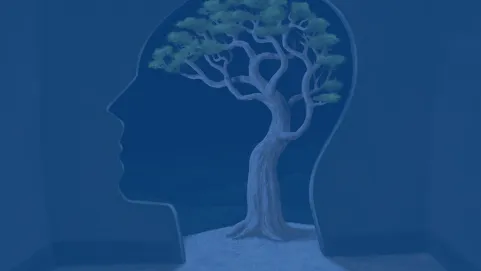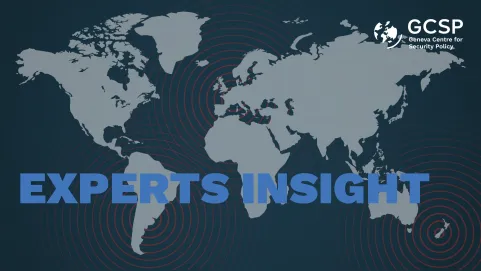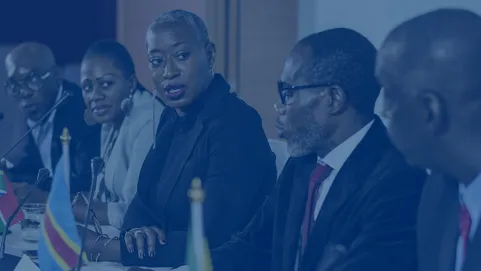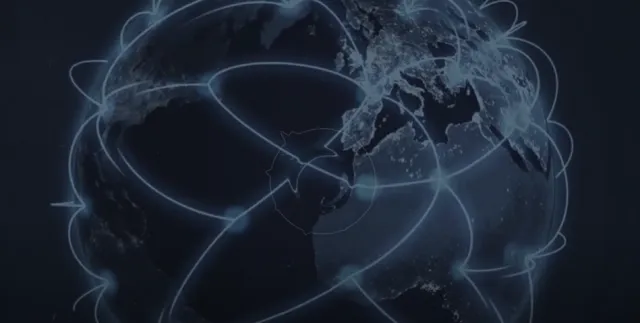Towards an Evidence-Based Arms Control and Disarmament - Episode 6
Ms Ashley Müller: Welcome to Episode 6, our bonus episode in this mini-series on evidence-based arms control and disarmament, I’m your host Ashley Müller with the Geneva Centre for Security Policy and in this episode we speak with Senator Marilou McPhedron, with the Senate of Canada as she discusses parliamentary work in arms control and disarmament affairs.
Ms Ashley Müller: Senator, thank you so much for joining us for this interview today, may I kindly invite you to introduce yourself.
Senator Marilou McPhedran: Thank you so much for the invitation to be with you today. My name is Marilou McPhedran. And I was born and raised in the prairies of Canada. Some people say that when that happens, a young woman learns to be assertive from an early age. And that adjective has been used to describe me. I came to the Senate of Canada, on the recommendation of Prime Minister Justin Trudeau in late 2016. So I'm just approaching my fourth anniversary in the Senate. Prior to that, I was a professor. And I still am a human rights lawyer with a specialisation in looking at human rights, both international and local. And a lot of my roots are actually in civil society. So many of my clients over the years and many of the opportunities that I had to work on issues, including disarmament and arms control came primarily through civil society organisations. So I think it's fair to say that very often, my framework is not a narrow parliamentary framework or a narrow institutional framework. Although I'm very grateful for the opportunities that I've had in a number of universities, I also have some background, limited background, working within the United Nations (UN) system. And for a number of years, I ran a course, a UN study course where I took students from Canada to the UN. And the course was actually built around classes held in a UN context, with lecturers from UN many of whom were in fact, Canadians, so they were often very helpful. My involvement on the topic for today, disarmament and arms control does come out of civil society primarily. And it comes from a very practical concern that I've had for a long time, as a mother, as a woman. And as someone who greatly respects indigenous teachings from Canada, what we can learn from elders. And for a very long time, indigenous women elders have been teaching us that planning is something that must not occur in the short term, that we need to plan seven generations ahead. And when we bring that man's to disarmament and arms control, I think it really, really helps to understand how high the stakes are, and how many mistakes were actually making on an almost daily basis in multiple, multi multilateral contexts.
Ashley Müller: Thank you so very much for that wonderful introduction. And to understand more about your involvement with disarmament affairs. My first question is, in your experience, of fulfilling your mission of oversight of the executive, what are the challenges you're facing in accessing accurate, independent and timely information on arms control and disarmament issues? What kind of evidence is needed? And what is working best? What could be improved?
Senator Marilou McPhedran: Well, I may be reverting a bit to my professor stance when I answer that, but I believe that answering questions has a great deal to do with the lens that we bring to the question. And for me, one of the most important perspectives to bring to that question is, yes, I'm a parliamentarian. But I also need to step back and understand the context. And I think that we have, we're struggling with a fundamental problem here with our definitions. And I think I would start with just our definition of security. You know, the surveys that have been done in country after country, including Canada, indicate that still, people tend to equate militarism with security. And the research doesn't support that. If the kind of security we're discussing and security of dictatorship, security where people's freedom is severely limited. Then okay. But that but the definition of security that has been evolving since the 1980s, in trying to appreciate what actually creates a secure society, and its people that create a secure society, it's people with the resources to be able to engage and to be the best human beings they can be. And to have a definition of security, that is, a parliamentarian that is largely filtered through a NATO lens, or a defence forces lens means that the true meaning of security on a day to day basis, which is health, and safety, and being able to access the essentials of life, in order to be fully functioning human beings, is lost. So I feel and I felt this more strongly with each year being a parliamentarian that we don't really bring together the evidence that is available. And I include this with all due respect to Inter-Parliamentary Associations, including the NATO Inter-Parliamentary Association, and to some extent, IPU, we don't actually bring together the ways of measuring and assessing what actually contributes to secure societies, high functioning, secure societies. And as a result of that, when we are in a crisis, as we indisputably are now, we turn to very old, limited, narrow models of what it is that's actually going to deliver security. And it's not our security, so-called security forces. And it's I mean, we know we all know this at an intellectual level. But emotionally there's another there's a gap because pretty much everybody knows that we already have stockpiled in this world, under the control of only nine countries in the world, weapons that can kill us 20 times over. But we're human, we only get to die once. And so the fact that so much of the discussion is continuing now to ramp up towards further escalation, of more of these weapons? Where I mean, what are we killing? It's, there's an absurdity to it, there's a poisoning of testosteronic reasoning to it, that that boggles my mind. So I'll continue because you asked me about the gathering of the evidence. If you are using a lens defining security primarily in terms of militarism, then the evidence or the information that is given to parliamentarians is skewed by that lens. And I think that, we end up in this situation over and over again, as parliamentarians, where there is this unofficial informal dismissal by referring for example, to soft diplomacy, or the soft version of security or the feminist version of security, which somehow is lesser than the male-dominated military responses and definitions and in many cases, control of our processes. So, when I as a parliamentarian, ask for information or when I as a parliamentarian, attend a meeting, where there's a wide range of discussion, it will often not always, but it will often sort of implicitly separate along gender lines. And that back to that indigenous teaching of the elders, generally speaking, I mean, women, at this point in human history are still the ones who carry within their bodies give birth to the next generation and generation after that. And there's a natural inclination. And again, the evidence we've lots of research and evidence on this. women when they govern women, when they develop policy, for the most part, exceptions, of course, look at what is the impact going to be on the children, on their families and their communities, and they allocate resources and they make decisions based on a sense of well being for their children or their grandchildren or their great-grandchildren. The other thing that shows up in research about attitudes is that very often you don't actually have to be someone who has herself had children, physically had children that there is still this gender divide. And again, it's not absolute by any means. I'm a co-founder in Canada, of the Canadian Association of Feminist Parliamentarians. It's a new organisation, we have about 70 parliamentarians, both embers of Parliament and Senators who are members. And we have a number of men who have stepped up and chosen to be part of this association. So by no means am I trashing men when I give this perspective. But the research does indicate that very often you have a different framework that women bring. So when you put women or when you put those who are dedicated to disarmament, because they deeply believe that there is no long term future for our world by continuing to define security in terms of militarism, and that includes a wide range of men and women in that category.
Getting on the agenda, just getting on the agenda can be a major issue. And a lot of subtle pressures that come to bear in a discussion, when a broader interpretation of security and measurements that are geared more to the soft aspect of defining security, in terms of human security, human well being, human safety becomes an often unspoken, but very deep divide within the formal meetings of organisations, like for example, the NATO Inter-Parliamentary Association. So the evidence that we need very often, those who are charged with gathering that evidence don't always have the latitude to include a broader definition. And sometimes just getting to that place of being able to have the people who are capable of doing the work for parliamentarians gathering the information and sharing it can itself become problematic.
Ashley Müller: Thank you very much for the comprehensive answer. Very insightful. Very interesting. Thank you. And the next question I have is on good practices in Parliament. What is your experience in cooperating with other actors, domestically and internationally, civil society organisations, research institutes, etc, in order to access and make available the information and data necessary for these missions?
Senator Marilou McPhedran: So my starting point in answering that question is to say a little bit about our situation in Canada. So the Canadian Senate is actually changing quite substantially. When I first came into the Senate of Canada, one of the senior officials said to me, do you have any idea how unusual Senators are in the Canadian democracy, and went on to tell me that, in fact, in the history of Canada, there are just over 1,000 people that have ever been Senators in the entire history of the country. And we are appointed. And there are big questions about whether or not that is actually adequately democratic. But it becomes, in some ways, a moot debate, because it's in our Constitution. And it is very clear, it's been confirmed by the Supreme Court of Canada, that nothing becomes a law in Canada, unless exactly the same bill is accepted by our elected House of Commons and our appointed Senate. And so we are a bicameral parliament. And there's just no way around that without changing our Constitution. And so went to your question, what's what happens in our working environment is that the changes that we're undergoing in the Senate of Canada, because historically for 150 years of our young country, within the Senate itself has been a dichotomy. And there's been people that have been appointed, affiliated with the governing party, and people that have been appointed affiliated by whoever happens to be in opposition as a political party and really, two parties. Now, we have 80% of the Senate of Canada, where the Senators are not affiliated with any of the political parties. We are truly independent. There's only one traditional political caucus left. So as a result of that, and the other aspect of this is that we are now at 49% percent of Canada's women. Prime Minister Justin Trudeau has appointed significantly more women, has recommended for appointment, significantly more women than men. And I know from my own personal experience, when called to be recommended for appointment, he has asked each and one of us where he's, he's recommended to be independent. And this is the primary driving change within our institution. So sorry for the big Canadian contextual explanation. But it becomes very important because now, a lot of the traditional decision making that parliamentarians have been following is actually not exactly the same as it's been for 150 plus years and in the Senate. And, and so the kind of information gathering the sharing the raising of awareness, if you want something passed in the Senate of Canada, you have a lot more work to do now, because you've got 80% of the Senators that are voting independently. So nobody tells us how to vote. And as a result of that, the kind of interaction that is necessary and just the awareness-raising becomes absolutely critical. And we're learning those of us who are newer to the Senate, we're learning a lot from parliamentarians, both on the House of Commons side, and in our own Senate, have been there for much longer, who understand the rules much better, and who are able to give us some of the skills around how to shift thinking, and, and the level of awareness. And I would say it's the starting point and is probably one of the single greatest challenges that we have, is raising awareness, because parliamentarians the world over live under an avalanche of information, an avalanche and digging your way through and figuring out what is the information that you're going to trust that you're going to rely on, that you're going to base your vote on, is actually in and of itself a huge task. We're very grateful. And we're very fortunate to have wonderful teams to have the resources to be helped by staff. But in the end, it's my decision and my responsibility, and I have to figure out, and so I decided I'm in an orange control. I'll just give a very brief example on this. So it was a difficult process that took some considerable time
for the Senate of Canada to agree with the House of Commons, to have Canada sign on to the Arms Control Treaty. One of our most recent pieces of international legislation dealing with arms control. Well, if we look at the current Treaty on Nuclear Disarmament, the ban of nuclear weapons leading towards, for which the civil society organisation’s ICAN received the Nobel Prize in those negotiations that went on in New York, there were probably maybe three Senators that actually were aware that that was going on. And, and that's largely because of the separation between parliamentarians and our officials, in our case, our Global Affairs, Canada, it's their full-time job to be involved in, in treaties and negotiations. And the decision making that occurs is not at the parliamentary level, it's at the government level, and I'm not disagreeing with that. But the practical reality is that most parliamentarians in Canada had no idea that Canada wasn't even in the room, in the whole lead up to negotiations, development of that crucial, crucial treaty, the future of our entire civilisation, and that Canada has refused to sign on to that Treaty. And that the pattern that you can see very clearly is it is the NATO countries that are not supporting this treaty. And that it is the NATO interpretation of the need for nuclear weapons in a very narrow policy framework that is the dominant respected motif, that that is the lens, the thinking that the way that definitions occur so that it's actually an almost inconceivable idea for most Canadian parliamentarians that that treaty should even be in development. And it's a surprise to almost everyone that I talked to, was a parliamentarian, that actually, that treaty is probably going to reach the requisite number of signatories. from other countries, and then NATO countries are going to be sitting on the side, not part of this process. And again, we're going to see this divide of haves and have nots just the way we see it in climate change. And we're we see this, this confluence, if you will, of forces that appear to be in separate categories, and they're really not. And so as a parliamentarian, to break through that avalanche of information, and to actually somehow bring colleagues to the place where they step back, and they just ask themselves a very simple question. What is at the heart of disarmament? You know, we're at the 75th anniversary year of the United Nations. We have a tremendous amount of information and imagery around the impact of nuclear weapons for example, but emotionally most people are insulated, have insulated themselves from that. And the definition of what it is that a parliamentary person, a parliamentarian should be doing is actually quite narrow in this regard.
Ms Ashley Müller: That’s all we have now for this episode. Thank you to Senator Marilou McPhedran for joining us in this mini-series. Click the next button to listen to our concluding remarks in this mini-series. In the meantime, don’t forget to follow us Spotify or iTunes or subscribe to us on your favourite podcast player and follow us across all of our social media channels.
Click the next button to get to the next episode!
Disclaimer: The views, information and opinions expressed in this digital product are the authors’ own and do not necessarily reflect those shared by the Geneva Centre for Security Policy or its employees. The GCSP is not responsible for and may not always verify the accuracy of the information contained in the digital products.
Featuring
 25 years GCSP: Towards an Evidence-Based Arms Control and Disarmament - Episode 6
">
25 years GCSP: Towards an Evidence-Based Arms Control and Disarmament - Episode 6
">
 25 years GCSP: Towards an Evidence-Based Arms Control and Disarmament - Episode 6
">
25 years GCSP: Towards an Evidence-Based Arms Control and Disarmament - Episode 6
">
 25 years GCSP: Towards an Evidence-Based Arms Control and Disarmament - Episode 6
">
25 years GCSP: Towards an Evidence-Based Arms Control and Disarmament - Episode 6
">
 25 years GCSP: Towards an Evidence-Based Arms Control and Disarmament - Episode 6
">
25 years GCSP: Towards an Evidence-Based Arms Control and Disarmament - Episode 6
">
 25 years GCSP: Towards an Evidence-Based Arms Control and Disarmament - Episode 6
">
25 years GCSP: Towards an Evidence-Based Arms Control and Disarmament - Episode 6
">
 25 years GCSP: Towards an Evidence-Based Arms Control and Disarmament - Episode 6
">
25 years GCSP: Towards an Evidence-Based Arms Control and Disarmament - Episode 6
">
 25 years GCSP: Towards an Evidence-Based Arms Control and Disarmament - Episode 6
">
25 years GCSP: Towards an Evidence-Based Arms Control and Disarmament - Episode 6
">
 25 years GCSP: Towards an Evidence-Based Arms Control and Disarmament - Episode 6
">
25 years GCSP: Towards an Evidence-Based Arms Control and Disarmament - Episode 6
">
 25 years GCSP: Towards an Evidence-Based Arms Control and Disarmament - Episode 6
">
25 years GCSP: Towards an Evidence-Based Arms Control and Disarmament - Episode 6
">



